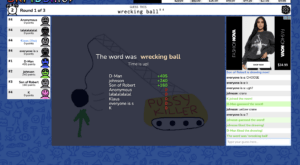Name of game: Skribbl.io
Creator: ticedev
Platform: Web browser
Target audience: The game targets people who enjoy social gaming experiences. The game allows users to interact with other people worldwide, making the game appealing to different age groups. Although there is no specified age range, the game requires the ability to relate images to concepts and items. Anyone above the age of eight may potentially play the game since most people could have developed pattern-matching skills by that age.
Skribbl.io can accommodate 2 to 12 players in a single game room, allowing for a customizable experience based on the group size and preferences. In this game, players take turns drawing a word assigned to them while others attempt to guess the word based on the drawing. The drawer has limited time to create their artwork, and the faster the other players guess the word, the more points both the drawer and the guesser earn. It usually comprises multiple rounds, with each player having the opportunity to draw once per round. Rounds are flexible and depend on the host’s preferences. Skribbl.io encourages collaboration and communication while fostering a healthy competition where players race to guess before others. Rather than solely trying to outdo their fellow players by themselves, players rely on each other’s drawing skills and word guesses to progress through the game and earn more points collectively. Skribbl.io stands out from other games by offering a unique combination of drawing, guessing, and social interaction. Its accessibility, customization options, and emphasis on communication make it popular for players seeking a light-hearted and enjoyable gaming experience.
The judging aspect of these games depends on other players’ ability to parse out what the other player is trying to draw. The drawing of the player represents them in a way and is somehow connected to the player’s abilities. In light of this, the essential personhood of any of the players is essentially removed from the game. One uses a name of choice, and players are not seen(avatars represent them); these components introduce a layer of anonymity. Hence, the user is not placed in a position where they have to reveal personal information.
In comparing Skribbl.io to others, judging games in its genre like Cards Against Humanity, I think that this game appeals to a broader range of players and has a lower potential for mildly(or not) offensive content. Skribbl.io is a lot more visually interactive as it draws on the drawing abilities of players without solely relying on the imagination. As a result, there is more room for expression and potentially more fun, not at the expense of other players.
I do think Skribbl.io helps the players experience the fun of expression primarily. Through the provision of creative elements, players can tap into their creative parts and produce compelling representations of the word being played. The guessing aspect also fosters the collective creativity of other users by utilizing their words to translate a given drawing. This game works because although you must draw and express creativity by depicting words, the online component takes the burden of drawing in person. When drawing online, the user cannot be seen and can therefore follow their imaginations without fear of ridicule or embarrassment. Although the game allows other players to like or dislike another’s drawing, it does not significantly impact a participant’s ego or emotions. Even with the layer of anonymity, the users can interact through the inclusion of a chat that is so fast-paced that it would resemble a real-life context.
To improve this game, I would adjust the number of guesses to correspond to the number of players rather than unlimited. This way, the players can think carefully about the words before placing them in the chat to provide more constructive and beneficial competition. I played it for the first time in preparation for this critical play, and I realized that people started placing random words in the chat before a user started drawing. I did not find that helpful to the game, and my focus shifted to trying to match the length of the word when the drawing had not even begun. I would also introduce a penalty system for incorrect guesses or deliberately misleading clues, discouraging players from making wild guesses or intentionally sabotaging the game.




